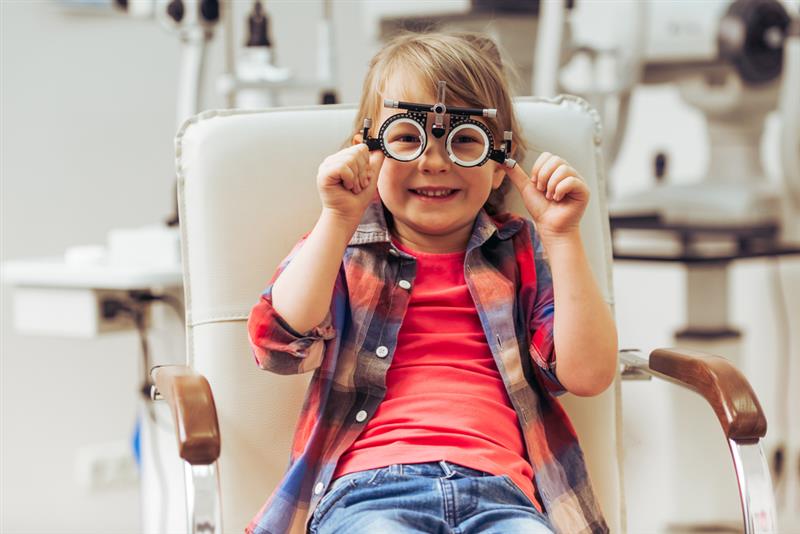How Paediatric Optometry Supports Neurodivergent Children in Perth: A Holistic Approach at Bullseye Clinic

Many families in Perth are navigating the challenges that come with raising neurodivergent children—whether it’s Autism Spectrum Disorder (ASD), ADHD, sensory processing disorder, or other neurological differences. While support often focuses on behavioural therapy, speech, and occupational therapy, paediatric optometry plays a crucial but often overlooked role in helping these children thrive.
At Bullseye Clinic, our integrated allied health team includes optometrists, occupational therapists, and a speech therapist, all working together under one roof. This means we can develop collaborative therapy plans that support the diverse and often complex needs of each child—helping them grow, learn, and engage with the world more comfortably.
More Than Just Eyesight: Understanding Vision in Neurodivergent Kids
Many people think vision is just about how clearly a child can see letters on an eye chart. But vision is so much more than sight—it’s about how the brain interprets what the eyes are seeing. In fact, over 80% of early learning happens through visual processing.
Children with neurodivergent profiles often experience:
- > Binocular vision dysfunction (difficulty using both eyes together)
- > Poor eye tracking and visual attention
- > Visual sensory overload
- > Reduced coordination between what they see and how they move or speak
These challenges aren’t always obvious, but they can have a big impact on learning, emotional regulation, and daily functioning.
At Bullseye Clinic, our kids’ optometrists in Claremont, Wembley, Applecross, and Bayswater provide personalised vision care to support neurodivergent children.
Why Vision—and Integration—Matters
Vision difficulties can mimic or intensify symptoms of ADHD, learning difficulties, or anxiety. For example, if a child sees double when reading, they may avoid books or act out in frustration.
What makes Bullseye Clinic unique is that we don’t just look at vision in isolation. Our team works together to connect the dots across all areas of development—vision, motor coordination, sensory integration, speech and communication.
This integrated approach helps us:
- > Identify hidden visual or sensory challenges
- > Understand how a child’s vision impacts their speech or behaviour
- > Tailor therapy plans that build on each child’s strengths
- > Support families with coordinated care and simple next steps
What to Expect at Bullseye: A Collaborative Assessment Process
Our assessments are gentle, fun, and designed around each child’s individual needs. We take the time to get to know your child, listen to your concerns, and work as a team to explore what’s going on beneath the surface.
Our comprehensive evaluations may include:
- > Optometric testing for eye health, visual acuity, and eye teaming
- > Occupational therapy assessments for sensory processing, motor skills, and regulation
- > Speech and language evaluations if communication or processing is a concern
- > Collaborative team meetings to discuss results and map out an integrated therapy plan
At Bullseye Clinic, our occupational therapy services in Wembley, Booragoon, and across Perth help neurodivergent children improve daily skills.
Case Study: Meet Ethan (6, Perth)
Ethan came to Bullseye Clinic after his parents noticed he was struggling in pre-primary. He had a diagnosis of Autism Spectrum Disorder and sensory processing challenges. His teachers reported difficulty with reading readiness, coordination, and emotional regulation.
At Bullseye, our team completed a joint assessment. We found that Ethan had:
- > Convergence insufficiency, affecting how his eyes worked together
- > Sensory overload in busy environments
- > Delays in fine motor skills and visual-motor integration
Our team of optometrists and occupational therapists developed a combined therapy plan, which included: - > Fun, play-based vision therapy to improve eye teaming
- > Sensory-motor activities to support regulation and movement
- > Collaboration with Ethan’s speech therapist to integrate visual supports in communication tasks
Over the next few months, Ethan became more confident in the classroom, started enjoying books, and began joining group activities with greater ease.
Vision Therapy as Part of a Bigger Picture
Vision therapy is like physiotherapy for the eyes and brain. It includes structured activities to improve how the eyes move, focus, and process information—skills that directly support reading, attention, and emotional regulation.
But at Bullseye, we go one step further. We ensure that our vision therapy is integrated with the child’s occupational and speech therapy goals. For example:
- > Working on eye tracking while supporting pencil grip and fine motor control
- > Using visual tools to support expressive and receptive language development
- > Adjusting environments to reduce sensory overload and increase participation
This holistic model means that families aren’t juggling multiple providers with conflicting plans—we’re all on the same team.
A Perth-Based Clinic, Designed for Neurodivergent Kids
Located in Perth, Western Australia, Bullseye Clinic is designed to feel safe, welcoming, and empowering for children of all ages and abilities. Our spaces are sensory-considerate, and our therapists are experienced in working with a wide range of neurodivergent presentations.
We also work closely with:
- > Perth-based paediatricians, GPs, and NDIS support coordinators
- > Local schools and kindergartens
- > Allied health professionals across WA
This allows us to stay connected to your child’s broader care team and ensure that support is consistent and well-communicated across settings.
Research-Informed, Family-Focused
Our therapy plans are grounded in the latest research from Australia and internationally. Studies have consistently shown that children with ASD, ADHD, and learning difficulties often experience co-occurring vision and sensory processing issues—and that integrated therapy can significantly improve learning, focus, and self-esteem.
We use evidence-based practices from:
- > The American Optometric Association
- > Peer-reviewed studies on neurodevelopmental vision and sensory integration
But we also know that research means nothing unless it works for your child—which is why we focus on individualised, family-focused care.
Is an Integrated Assessment Right for Your Child?
If your child:
- > Has a diagnosis of autism, ADHD, or sensory processing disorder
- > Is struggling with reading, focus, or learning
- > Gets easily overwhelmed in busy visual or sensory environments
- > Has difficulty with coordination or communication, an integrated allied health assessment may help uncover the missing pieces.
You don’t need a referral to book with us, and we’re always happy to chat with families about whether an assessment might be helpful.
Final Thoughts
At Bullseye Clinic, we believe neurodivergent children deserve support that recognises their unique way of seeing and being in the world. That’s why we offer integrated, holistic care to help your child feel seen, supported, and successful—in whatever ways matter most to them.
If you’re in Perth and want to explore how our team can help, we’d love to meet you.
Get in touch today or call us on (08) 9242 2342 to book your first appointment or find out more.
- 19 Jan 2026 Leeming Clinic Social Story
- 24 Dec 2025 2025 Christmas Trading Hours
- 09 Apr 2025 Pattern Glare and Sensory Overload: Why Shopping Centres Can Be a Nightmare – and How Neuro-Optometry Can Help
- 13 Dec 2024 2024 Christmas Trading Hours
- 10 Dec 2024 Struggling with Vision Problems? It Could Be Binocular Vision Dysfunction



Ready to Book an Appointment?
Our experienced and friendly team are ready to help you and answer any questions you might have.
Book a Consultation

